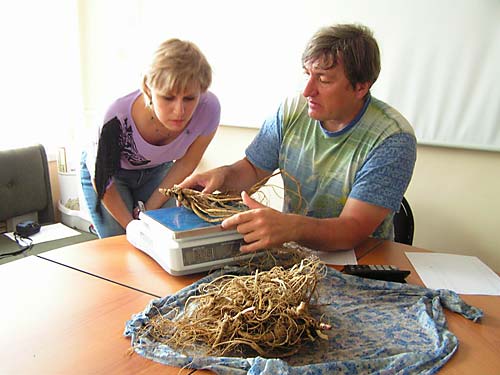Russian Customs get to the root of ginseng smuggling
Ussuriiskii, Russian Far East, 2nd July 2010—Ussuriiskii Customs officers have seized 160 wild ginseng roots from a bus travelling to China.

Ginseng is a protected species in Russia with the population there listed in Appendix II of CITES (the Convention on International Trade in Endangered Species of Wild Fauna and Flora), thereby restricting its international trade.
Each summer wild Ginseng is illegally collected in the Primorye region and smuggled to the Asia-Pacific region.
On 27 June, Ussuriiskii Customs officers, working in co-operation with border service officers, discovered two plastic bags containing 2.5 kg of wild Ginseng roots on board a bus heading to China. The driver, a Chinese citizen, was unable to explain the presence of the ginseng in his vehicle, and may now face criminal charges.
The confiscated Ginseng was sent for identification, a process assisted by staff from TRAFFIC and the Amur branch of WWF-Russia.
“According to expert estimates, more than one tonne of wild ginseng is extracted each year in the southern Russia Far East,” said Natalia Pervushina, Co-ordinator of TRAFFIC’s programme in the Russian Far East.
“This rate of extraction is unsustainable, and despite Ginseng’s Red Data Book status in Russia, it remains unprotected in the taiga; the only check on the illicit trade is at border crossings, which hardly benefits the species’s conservation.”

Pavel Fomenko, Co-ordinator of the Biodiversity Conservation Programme for WWF-Russia’s Amur branch noted: “We hope the confiscated roots will quickly be returned to the wild or to nurseries.”
“In the past, bureaucratic delays have often led to seized contraband being destroyed, even though the roots are still viable,” he added.
Earlier in the week, a sniffer dog service run by Customs in the region to help detect illegal wildlife trade celebrated its second anniversary. Since the service’s creation in June 2008, there have been many seizures of illegal wildlife products, especially by Khasanskaya, Vladivostokskaya and Blagoveshcenskaya Customs officers, thanks to the specially trained canines.
Seizures have included bear gall gladder, Saiga horns, musk deer pods, wild Ginseng and other species listed in CITES.
“In one instance a North Korean man wrapped musk deer pods in paper, sprinkled the parcel with petrol, placed it inside a plastic bag and then wrapped it in a condom, but even that wasn’t sufficient to fool Greta, one of the most perceptive sniffer dogs,” said Natalia Pervushina.
Currently 76 dogs operate in the service, 26 additionally trained to detect wildlife products. Both TRAFFIC and WWF staff have helped support the sniffer dog programme since its inception.



